人教新课标高中英语必修四Unit 3 A taste of English humour导学案
- 格式:doc
- 大小:39.00 KB
- 文档页数:4
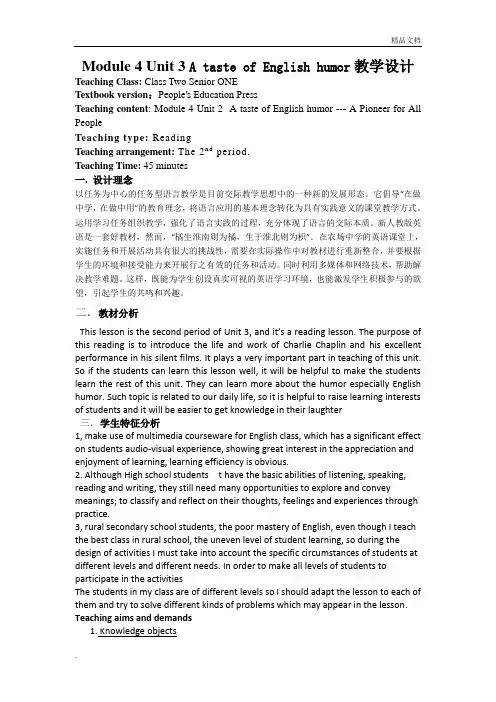
Module 4 Unit 3 A taste of English humor教学设计Teaching Class: Class Two Senior ONETextbook version:People's Education PressTeaching content: Module 4 Unit 2 A taste of English humor --- A Pioneer for All PeopleTeaching type: ReadingTeaching arrangement: The 2n d period.Teaching Time: 45 minutes一. 设计理念以任务为中心的任务型语言教学是目前交际教学思想中的一种新的发展形态。
它倡导“在做中学,在做中用”的教育理念,将语言应用的基本理念转化为具有实践意义的课堂教学方式。
运用学习任务组织教学,强化了语言实践的过程,充分体现了语言的交际本质。
新人教版英语是一套好教材,然而,“橘生淮南则为橘,生于淮北则为枳”。
在农场中学的英语课堂上,实施任务和开展活动具有很大的挑战性,需要在实际操作中对教材进行重新整合,并要根据学生的环境和接受能力来开展行之有效的任务和活动。
同时利用多媒体和网络技术,帮助解决教学难题。
这样,既能为学生创设真实可视的英语学习环境,也能激发学生积极参与的欲望,引起学生的共鸣和兴趣。
二.教材分析This lesson is the second period of Unit 3, a nd it’s a reading lesson. The purpose of this reading is to introduce the life and work of Charlie Chaplin and his excellent performance in his silent films. It plays a very important part in teaching of this unit. So if the students can learn this lesson well, it will be helpful to make the students learn the rest of this unit. They can learn more about the humor especially English humor. Such topic is related to our daily life, so it is helpful to raise learning interests of students and it will be easier to get knowledge in their laughter三.学生特征分析1, make use of multimedia courseware for English class, which has a significant effect on students audio-visual experience, showing great interest in the appreciation and enjoyment of learning, learning efficiency is obvious.2. Although High school students t have the basic abilities of listening, speaking, reading and writing, they still need many opportunities to explore and convey meanings; to classify and reflect on their thoughts, feelings and experiences through practice.3, rural secondary school students, the poor mastery of English, even though I teach the best class in rural school, the uneven level of student learning, so during the design of activities I must take into account the specific circumstances of students at different levels and different needs. In order to make all levels of students to participate in the activitiesThe students in my class are of different levels so I should adapt the lesson to each of them and try to solve different kinds of problems which may appear in the lesson. Teaching aims and demands1. Knowledge objectsMake the students be aware of the cultural aspects of humor by learning this lesson.2. Ability objects1. Develop students’ ability and let them learn different reading2. Enable students to talk about types of humors and Charlie Chaplin3. Moral objects①To enable the students to learn to be faced with difficulties and overcome them.②To encourage them to keep up optimistic attitude towards life and improve their sense of humor.Teaching key points1. Help the students grasp the reading skills.2. Help the students to learn to get information, analyze the information and understand the information from the text.Teaching difficulties1. How to fire the students’ enthusiasm to express their ideas.2. To make the students know the acting style of Charlie Chaplin and understand the connotation of humor.Teaching methods: Task-based teaching method, Skimming, Scanning and Group discussion.Teaching aids: A multi-media classroom.Teaching procedures & ways:Step 1 Lead-in (4 minutes)1.show a famous poem to students【设计说明】图片能吸引学生注意力,从而调动他们学习的积极性。
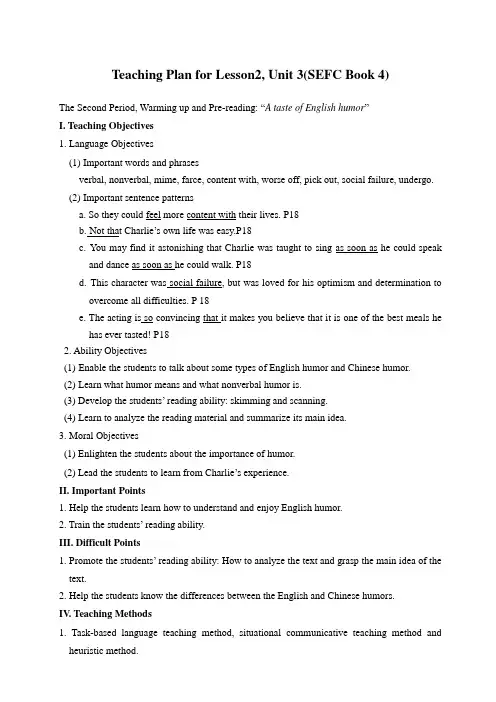
Teaching Plan for Lesson2, Unit 3(SEFC Book 4)The Second Period, Warming up and Pre-reading: “A taste of English humor”I. Teaching Objectives1. Language Objectives(1) Important words and phrasesverbal, nonverbal, mime, farce, content with, worse off, pick out, social failure, undergo.(2) Important sentence patternsa. So they could feel more content with their lives. P18b.Not that Charlie’s own life was easy.P18c.You may find it astonishing that Charlie was taught to sing as soon as he could speakand dance as soon as he could walk. P18d.This character was social failure, but was loved for his optimism and determination toovercome all difficulties. P 18e. The acting is so convincing that it makes you believe that it is one of the best meals hehas ever tasted! P182. Ability Objectives(1)Enable the students to talk about some types of English humor and Chinese humor.(2) Learn what humor means and what nonverbal humor is.(3) Develop the students’ reading ability: skimming and scanning.(4) Learn to analyze the reading material and summarize its main idea.3. Moral Objectives(1) Enlighten the students about the importance of humor.(2)Lead the students to learn from Charlie’s experience.II. Important Points1. Help the students learn how to understand and enjoy English humor.2. Train the students’ reading ability.III. Difficult Points1. Promote the students’ reading ability: How to analyze the text and grasp the main idea of the text.2. Help the students know the differences between the English and Chinese humors.IV. Teaching Methods1. Task-based language teaching method, situational communicative teaching method and heuristic method.2. Teaching Aids: a projector, a computer, blackboard, and some pictures, etc.V. Teaching ProceduresStep I Lead-in (3 mins)1.Greet the whole class as usual.2.Begin with a question to arouse the students’ attention.3.Introduce two English humors to help them get a general understanding of Englishhumor.T: Hello! At the very beginning of our today’s class, I would like to ask you a question.Why would a thief break into a shop three times? Can you guess the answer?S1: …S2: …T: Both of you did excellent jobs! Well, the story is…T: What are you laughing at? Is it the thief who makes you laugh?S: …T: The thief is humorous, right? As is known to all, humor is a word which meansmaking others laugh. If someone often makes others laugh, just as the thief does, wesay he is humorous. We call him a humorist. Today, we are going to have a wonderfultaste of English humor.Step II Warming up(10mins)1.Talk about verbal and nonverbal humors and find their differences.2.Show some pictures to the students. Ask them to guess who the typical actors in thepictures are and introduce them.3.Explain different types of humors in English and Chinese.4.Deal with the chart part on page 17.T: The English humors we just came across are called verbal jokes. Actually, there are two kinds of humors: verbal and nonverbal humor. Verbal means spoken, that is tosay we use spoken words only. However, nonverbal humor mainly relies on ourfacial expressions or gestures, instead of using words. Next, I will show you somepictures. Guess who they are.S: The first one is …T: Yes, I dare say that everybody knows him. How about the second picture?(Deal the rest in the same way)T: These are some typical actors or writers in foreign countries. There are also manymasters of verbal or nonverbal humor in china. Can you name some? I’ll showyou some pictures again. See, who are they and what are they good at? Nonverbal,mime, farce, funny tales or funny poems?S: The first picture is …T: You get it! Do you know what they are good at?S: …T: Good. I think Zhao Benshan is famous for his mime, too. The third one is Hou Baolin, who was a famous cross talk actor. But what a pity, he died. The last one is Liu Quanhe & Liu Quanli, they are good at pantomime. Can you finish the chart now?T: Sometimes English humors sound no funny at all to us. Because the sense of humor between English and Chinese is different, it is particular to each culture. So we should learn to enjoy different types of humor.The suggested answers:English humor Chinese humornonverbal Mime 刘全和、刘全利farce Sketch 陈佩斯、赵本山Verbal jokes Cross talk 侯宝林Step III Pre-reading (4 mins)1.Work in pairs to share what they know about Charlie Chaplin.2.Introduce some basic information of Charlie Chaplin to the students.3.Based on the title and the pictures in the text, ask the students to predict its content.T: Just now we shared some information of the humor masters. But we left oneperson behind. Do you still remember who he is?S: …T: Well done! What do you think of Charlie Chaplin?T: Can you name some of his masterpieces?S:…T: Excellent! His masterpieces are: The Gold Rush, Modern Times, The Little Tramp,City Night and the like.T: Today we are going to learn something about him. Welcome to our text part AMaster of Nonverbal Humor. Please look at the title and the pictures of the passageand predict its content. This passage is about:A. The story of English humorB. The films that Chaplin madeC. The humor Chaplin made in his filmD. The Gold Rush in CaliforniaStep IV Reading (15 mins)1.Skimming: ask the students to skim the whole text within 6 minutes. In thisprocedure, students should complete the following two tasks:(1)Answer the following questions.a. Why did people need cheering up?b. What was Charlie Chaplin’s childhood like?c. What was his most famous characteristic like?d. Can you give an example of a sad situation that he made it funny?e. What were his achievements?(2)Sum up the main ideas by themselves first, then discuss with group members.2.Deal with the reading part. Analyze the text paragraph after paragraph. Find out thetopic in each paragraph.(Cooperative learning)Paragraph 1: The world situation.Paragraph 2: Charlie Chaplin’s childhoodParagraph 3: His famous worksParagraph 4: An example of his workParagraph 5: His achievements3.Divide the text into 3 parts and explain why so.4.Summarize the main idea of the whole text then confirm the prediction in pre-readingpart.T: Please skim the whole text within 6 minutes, and then sum up the main idea ofeach paragraph based on the questions bellow. Then we will analyze the text.(After listening to the tape, students will have a discussion.)T: OK. I’m glad you have thought actively and had a heated discussion. Now lookat Paragraph One. What does the first paragraph mainly talk about?S1: …(Deal with the rest of the text in the same way)Step V Scanning and speaking (8 mins)1.Ask the students to scan the text for specific information about Charlie Chaplin’s lifeand career.2.Ask them to make an interview according to the reading passage.3.Ask two pairs of students to role-play their interview.4.Help them to fill the blanks in the text book then check the answers.T: Imagine that you are Charlie Chaplin, and your partner is a journalist. Make aninterview according to the reading passage. You can begin like this:J: Excuse me, I’m a repo rter from 21st Century, may I ask you some questions, Mr.Chaplin?C:...(Show on PPT)T: Good! Thanks for your amazing performance. Now try to fill the blanks in the text inone minute.Step VI Summary(4mins)1.Make a summary of the whole text.2.Discuss some questions to lead them learn from Charlie Chaplin’s perseverance,optimistic and humor. Meanwhile, help them to realize that humor is to makepeople become optimistic about everything around.T: Our text takes Charlie Chaplin as an example. It tells us what nonverbal humormeans… Then, we will have a discussion about the text. There are two questions.Discuss them with your partner.(1). Do you think his childhood helped him in his work? Why?(2). Why do you think he is so successful?T: Who would like to share your opinions?S:…T: You are right. Anyway, I hope all of you can learn from Charlie Chaplin ,and be optimistic(乐观) in spite of what difficulties come to you. I think humor is everywhere in our daily life. No matter you are rich or poor; you should live our own happy life. Step VII Homework Assignment (1 min)T: Well, so much for today. Do you have any questions about what we have learned?(Wait for the students’ response.) If there is no question, please remember your homework:1.Read the text again and think about why we divide the text into three parts.2.Finish the Comprehending and Learning about Language on P19.VI. Blackboard Design。
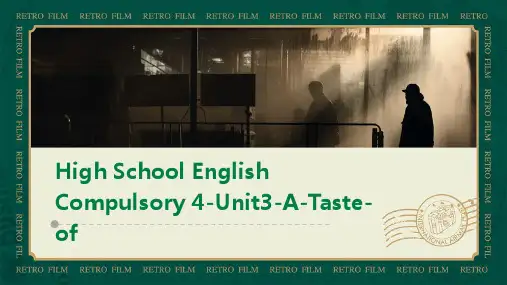
![新人教必修四_Unit_3_A_taste_of_English_humor[Reading课件]](https://uimg.taocdn.com/9a7cd223b307e87101f696c1.webp)
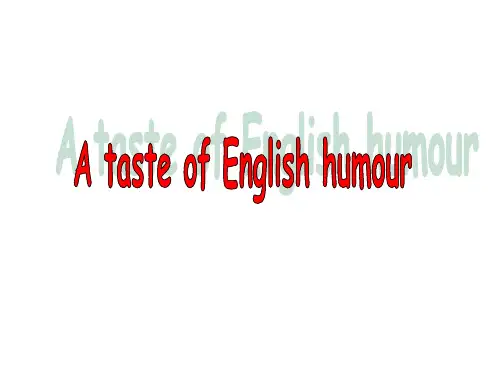
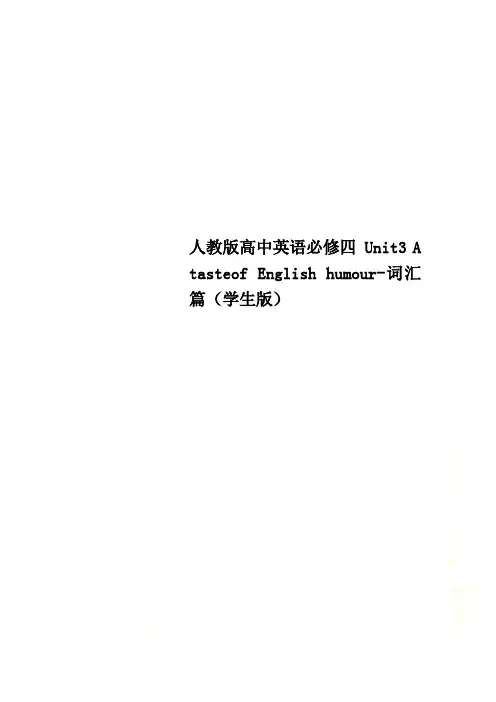
人教版高中英语必修四 Unit3 A tasteof English humour-词汇篇(学生版)face.他对这次竞赛中获得第二名很满意,因此脸上露出了满意的微笑。
2. break into强行进入,破门而入;撬开(汽车等);突然开始(笑、哭)break away from摆脱;脱离,背叛(政党、国家等) break down出故障;失败;垮掉break in强行闯入,打断break out爆发;突然发生break through突围;突破break up粉碎;结束;散开;(学校)期终放假break off断开;停顿;突然中止E.g. The thief broke away from the police and ran into the woods.小偷摆脱了警察跑进了树林。
E.g. Don't break in while others are speaking.别人讲话时不要插话。
E.g. The car I was in broke down, so I had to walk home.我坐的车抛锚了,所以我不得不走路回家。
E.g. A big fire broke out in the town last night.昨天晚上镇里着了大火。
E.g. The meeting broke up without a result.会议没有得出结果就结束了。
E.g. Strong will can almost break through everything.顽强的意志几乎可以战胜一切。
3. persuade/convincepersuade 着重利用督促、劝告来感动和影响听者,使其愿意相信某事或参与某种行为E.g. I persuade him to quit smokingconvince指用理论、证据等理智方面的因素使别人相信4. as/withAs (conj.)随着,常用来引导时间状语从句With(prep.)随着,后接名词或复合宾语,不引导从句E.g. He gave me so many facts that convinced me.三、要点梳理1. content(1)adj.满足的;满意的①We shouldn't be content with the achievements already gained.我们决不能满足于已取得的成绩。
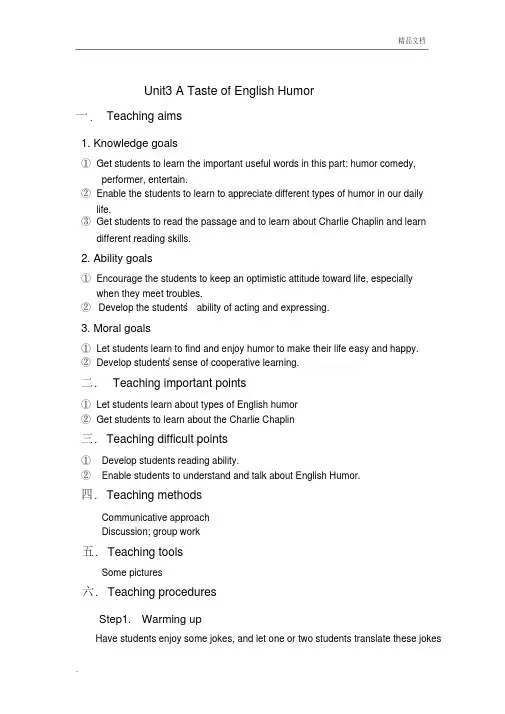
Unit3 A Taste of English Humor一.Teaching aims1. Knowledge goals①Get students to learn the important useful words in this part: humor comedy,performer, entertain.②Enable the students to learn to appreciate different types of humor in our dailylife.③Get students to read the passage and to learn about Charlie Chaplin and learndifferent reading skills.2. Ability goals①Encourage the students to keep an optimistic attitude toward life, especiallywhen they meet troubles.②Develop the students’ ability of acting and expressing.3. Moral goals①Let students learn to find and enjoy humor to make their life easy and happy.②Develop students’ sense of cooperative learning.二.Teaching important points①Let students learn about types of English humor②Get students to learn about the Charlie Chaplin三.Teaching difficult points①Develop students reading ability.②Enable students to understand and talk about English Humor. 四.Teaching methodsCommunicative approachDiscussion; group work五.Teaching toolsSome pictures六.Teaching proceduresStep1. Warming upHave students enjoy some jokes, and let one or two students translate these jokesinto Chinese.Joke 1. Policeman: Why did you have to break into the same shop 3 times?Thief: Well, I stole a dress from that shop but my wife didn’t like itSo I had to go back and change it twice!Joke2 Custom: What’s that fly doing in my soup?Waiter: Swimming, I thinking!2. Encourage students to tell the humors they know in front of the class.Step2. Lead-inAs the title suggests, in this unit we are going to taste some English humour.Now look at this picture. Do you know who is he? Do you know about him? Youmust have seen his humorous films. I am sure a lot of people like to see his play.If you not quite familiar with him, now please pay attention to the class. Thisclass we will learn about Charlie Chaplin who considered one of the greatest andfunniest actors in the historyStep3. ReadingHave students work in pairs to discuss following questions, and then reporttheir ideas to the class.1.Do you think Charlie Chaplin’s childhood helped him in his work? Why?2.Why do you think he is so successful?3.What should we learn from Charlie Chaplin?4.What should we do to succeed?We should be optimistic no matter what difficulties we meet withDo our best. Pay more time then others.Never give upStep4. SummaryIn our daily life, we may meet with some happiness and joys, but we will alsomeet with some sadness and sorrow. When we meet with some sadness, whatshould we do? We should be optimistic and staunch. D on’t forget to s mile! AsVictor Hugo once said:“Laughter is the sun that drives winter from the human face.” --------Victor HugoStep5. Homework1. Ask each student to give a joke and present it in class next period.2. Find out the new words and useful expressions in this text.Blackboard designUnit3. A taste of English humor1. Do you think Charlie Chaplin’s childhood helped him in his work? Why?2.Why do you think he is so successful?3.What should we learn from Charlie Chaplin?4.What should we do to succeed?课后反思在讲这片课文过程中,我发现同学们的想象力是非常丰富的。
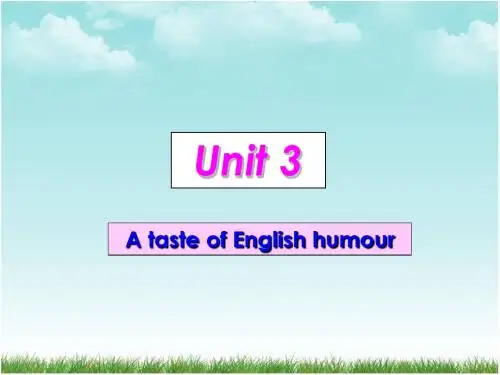
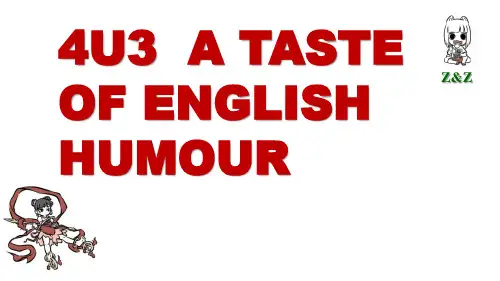
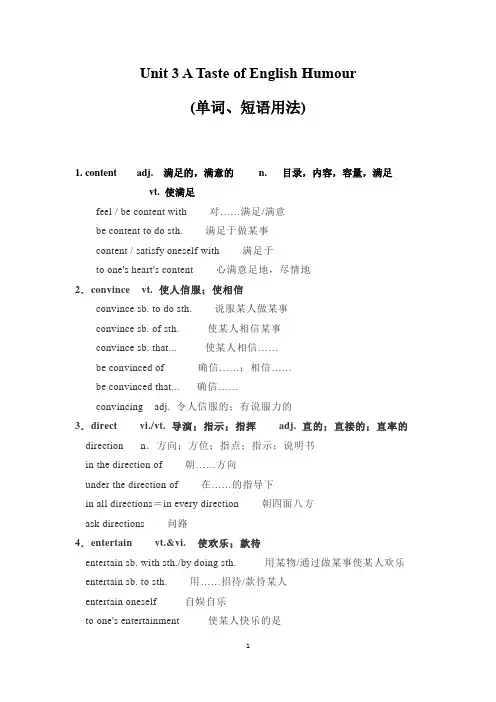
Unit 3 A Taste of English Humour(单词、短语用法)1.content adj. 满足的,满意的n. 目录,内容,容量,满足vt. 使满足feel / be content with 对……满足/满意be content to do sth. 满足于做某事content / satisfy oneself with 满足于to one's heart's content 心满意足地,尽情地2.convince vt. 使人信服;使相信convince sb. to do sth. 说服某人做某事convince sb. of sth. 使某人相信某事convince sb. that... 使某人相信……be convinced of 确信……;相信……be convinced that... 确信……convincing adj. 令人信服的;有说服力的3.direct vi./vt. 导演;指示;指挥adj. 直的;直接的;直率的direction n.方向;方位;指点;指示;说明书in the direction of 朝……方向under the direction of 在……的指导下in all directions=in every direction 朝四面八方ask directions 问路4.entertain vt.&vi. 使欢乐;款待entertain sb. with sth./by doing sth. 用某物/通过做某事使某人欢乐entertain sb. to sth. 用……招待/款待某人entertain oneself 自娱自乐to one's entertainment 使某人快乐的是5.amuse vt. 使发笑;使愉快amused adj.觉得好笑的;逗乐的amusing adj. 有趣的;逗乐的be amused at/by ... 对……觉得好笑keep sb. amused 使某人快乐be amused to hear/see/find... (听到、看到、发现等)觉得好笑的amusement n. 愉悦;娱乐to one's amusement 使某人感到好笑的是6.particularly adv. 尤其;特别particular adj. 特殊的;特别的;挑剔的n. 细节;细目be particular about/over sth. 对……讲究/挑剔be particular to do sth. 特地做某事in particular=particularly 尤其;特别;格外7.fortunate adj. 幸运的;吉利的be fortunate to do sth./in doing sth. 在……方面运气好fortunately adv. 幸运地,吉利地fortune n. 机会,运气;财富;命运;际遇8.whisper vi./vt. 低语;小声说;把(秘密等)悄悄传开n. 耳语;低语whisper to sb.向某人低声说It is/was whispered that ... 据秘密传闻……in a whisper=in whispers=in a low voice 耳语地;低声地9.react vi. 作出反应;回应react to sb./sth. 对某人/某事物作出反应;回应react against sb./sth. 反对/反抗某人/某物reaction n. 反应;感应reaction to sb./sth. 对某人/某事的反应10. astonish vt. 使惊诧be astonished at 对……感到惊讶be astonished to do sth 惊讶地干某事astonished adj. 感到惊讶的astonishing adj. 令人感到惊讶的astonishment n. 吃惊,惊讶11.occasion n. 时刻;场合by occasion of 因为……on occasion 有时;间或occasional adj. 偶尔的;偶然的occasionally adv. 偶然地;有时12. ordinary adj. 平常的,普通的辨析:ordinary/common/usual/normalordinary:“普通的”,指平淡无奇;common:“共同的;普遍的”,指因为许多人或物共同具备而常见;usual:“通常的;惯常的”;normal:“正常的;标准的”,形容人或物符合常规或常态。
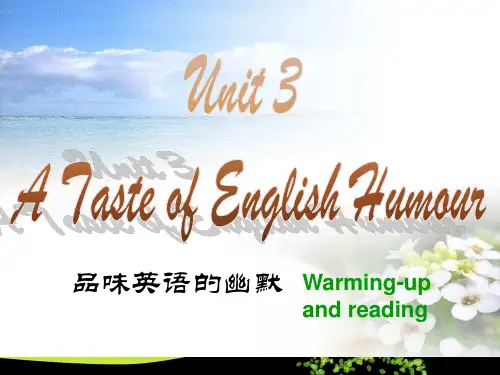
新人教必修四Unit3AtasteofEnglishhumour新人教必修四Unit3 A taste of English humour[阅读]A taste of English humour新人教必修四Unit3 A taste of English humour[阅读]Let’s enjoy a videoMr. BeanNonverbal mime and farce新人教必修四Unit3 A taste of English humour[阅读]Warming up I C brainstormingHow many kinds of humor do you know about?Types of humour Example of English humour Do you have the humour in China?1.Nonverbal mime and farce2.Verbal jokesCharlie Chaplin Mr. Bean Play on words, usually two lines Mark TwainEdward Lear3.Funny stories4.Funny poems新人教必修四Unit3 A taste of English humour[阅读]nonverbal mime and farce新人教必修四Unit3 A taste of English humour[阅读]Verbal jokesI think that I'm a chickenPsychiatrist: What's your problem?Patient: I think I'm a chicken. Psychiatrist: How long has this been going on? Patient: Ever since I was an egg!新人教必修四Unit3 A taste of English humour[阅读](funny stories)Mark Twain was the popular and humorous American author, He was the most famous humorous novelist in America. Mark Twain新人教必修四Unit3 A taste of English humour[阅读](funny poems)There Was an Old Man with a BeardThere was an Old Man with a beard, Who said, “It is just as I feared! -Two Owls(猫头鹰) and a Hen, four Larks(云雀) and a Wren(鹪鹩), Have all built their nests in my beard.Edward Lear (1812-1888)新人教必修四Unit3 A taste of English humour[阅读]新人教必修四Unit3 A taste of English humour[阅读]Can you say something about Charlie Chaplin?First appearance on the stage:_____________ at the age of 5 First film part in the USA: _______________ 1912 Acted in:_________films 13 Wrote directed: __________ films 69 Most famous films:_________________________ City Lights and Modern Times 新人教必修四Unit3 A taste of English humour[阅读]Show time!新人教必修四Unit3 A taste of English humour[阅读]新人教必修四Unit3 A taste of English humour[阅读]Fast-readingWrite notes about Ch arlie Chaplin’s career.Notes on Charlie Chaplin’s career Born Died JobWin an Oscar1889 1977 actor 1972新人教必修四Unit3 A taste of English humour[阅读]Detail-readingTask1: Read para1 and answer the question:Why do some people seem to enjo y seeing other people’s bad luck at times?新人教必修四Unit3 A taste of English humour[阅读]Detail-readingTask2: Read para2 and fill in the chart.新人教必修四Unit3 A taste of English humour[阅读]Notes on Charlie Chaplin’s careerthe tramp, a poor and Character homeless person 人物large trousers, worn-out shoes Costume small round black hat 服装and a walking stick新人教必修四Unit3 A taste of English humour[阅读]a small black hata moustachea stickPicture of charlievery wide trousersHe wore a small black hat, very wide trousers, a moustache and carried a stick that he swung in the air as he walked.新人教必修四Unit3 A taste of English humour[阅读]The Gold Rush新人教必修四Unit3 A taste of English humour[阅读]Detail-reading Task3: Read para 4 and fill in the blanks. How does Charlie Chaplin make eating a boiled shoe funny? First he picks out the laces and eats them ______ as if they were spaghetti. Then he ______ ___ cuts off the ________of the shoe, treating it as if it leather top were the finest ____. Finally he tries meat bottom cutting and eating the _____ of the shoe. chew You can imagine how difficult it is to ____, but he seems to eat every mouthful with _______ great enjoyment.新人教必修四Unit3 A taste of English humour[阅读]Detail-reading Task4:Guess the meaning according to the text.This character was a social failure but he was loved by all whowatched the film for his determination in overcoming difficulties…。
一.重点单词学法指导:识记P97词汇表单词,然后默写出来。
对于不会的通过查阅字典。
同学吧,相信你们自己的记忆力,加油吧!(记住,一定是默写,不可以抄写哦,记住)1. adj.& n.& vt. 满足的;满意的;满足;使满足2. n. 喜剧3. prep.& adv. 遍及;贯穿;到处;始终;4. vt.& vi. 战胜;克服5. adj. 突出的;杰出的;显著的6. n. 耳语;低语vt.& vi. 低语;小声说7.bored adj.厌烦的→ adj.令人厌烦的8.directvt.& vi.导演;指示;指挥adj.直的;直接的;直率的→ adv.直接地;立刻地→ n.方向→ n.导演9.depressed adj.忧愁的;沮丧的→ adj.使人沮丧的→ n.沮丧;不高兴10.fortune n.幸运;财富→ adj.幸运的;吉利的→adv.幸运地→adv.不幸地11.entertain vt.&vi.使欢乐;款待→ adj.愉快的;有趣的→ n.款待;愉快12.convince vt.使信服→ adj.令人信服的→ adj.确信的;深信的13.particular adj.特殊的;特别的n.细节;细目→ adv.尤其;特别地14.humour n.幽默;滑稽→ adj.幽默的15.astonish vt.使惊诧→ adj.令人感到惊讶的→ adj.惊讶的16.performer n.表演者;演出者→ v.执行;表演→ n.执行;演出写出下列短语,并反复朗读,不会的可查阅资料完成。
1. 贫穷的,缺少的___________2. 挑出;辨别出____________3. 切断;断绝__________________4. 主演__________________5. 到现在为止__________________6. 对……感到满足_________________自主探究一、重点单词。
1.astonish vt 使惊讶(= surprise sb. greatly) astonishment n. 惊讶【拓展】:astonishing adj.令人震惊的;astonished adj.感到惊呀的[典例] 1). The news astonished everybody.2). I was astonished at/to hear the loud sound.[重点用法]be astonished at/by sth. be astonished to do sth. It astonishes sb. that....be astonished that to one’s astonishment【即学即练】:根据句子的要求在横线上填入astonish的适当形式。
1). It ________________me that no one has thought of this before.2). We were ______________ (astonish) that he appeared at the party.3). I find it quite ______________ (astonish) that none of you like the play.4). To my _________________,he has made the same mistake three times.2. entertain vt.使欢乐;款待【拓展】entertaining adj.愉快的;有趣的entertainment n. 娱乐;款待[典例] 1). Bob and Liz entertained us to dinner last night.2). Could you entertain the children for an hour, while I make supper?[重点用法] entertain sb. with sth./by doing sth.【即学即练】根据句子的要求在括号里填入适当的词。
1). He entertained us for hours ________ (介词) his stories and jokes.2). He fell in the water, much to the ___________ (entertain) of the children.3). We hired a magician to keep the children ______________ (entertain).3. convince vt. 使信服;使确信【拓展】convincing adj. 令人信服的[典例] 1). We convinced him to go by train rather than plane.2). How can I convince you (of her honesty)?[重点用法]convince sb. of sth. convince sb. to do sth. convince sb. that b e convinced of / that 【即学即练】根据句子的要求在括号里填入适当的词。
1). What she said ____________ (convince) me that I was mistaken.2). I soon convinced him ______ (介词) my kindness.3). What convinced you _______ (vote) for them?4). I’m ________ (convince) that he is guilty.5). That was the most __________ (convince) thing I had ever heard.4.throughout prep.遍及, 贯穿adv. 到处, 始终, 全[典例] 1). It rained throughout the night.2)Hearing the news, she cried throughout the night【联想拓展】1)作介词时,throughout + 地点= all over + 地点throughout + 时间= all through + 时间throughout the day throughou t one’s life throughout the country throughout the night 2)throughout 作副词时,常用于句尾。
如:The house is painted throughout.【即学即练】翻译句子:1)The disease spread _________ ______ _______. 这种疾病蔓延全国。
2)It snowed ____________ _______ _______. 雪整整下了一夜。
3)The house is _________ ________.这房子处处都建得很好。
5. failure 可数名词“失败的人或事”不可数名词“失败”fail v.失败,不及格【联想拓展】succes作可数名词“成功的人或事”不可数名词“成功”[典例]1). Never think you are a failure .2). As the old saying goes, “Failure is the mother of success.”3).She failed to pass the exam again. 【即学即练】:——How about _______ Christmas evening party?——I should say it was ____ failure, for everyone was bored.A .a,aB .the;a C. a;不填 D.the, 不填二、重点短语。
1. up to now “直到现在/到目前为止”(通常与现在完成时连用)[典例] 1).Up to now, I’ve read two books.2).I haven’t heard from him up to now.【联想拓展】同义短语so far,by/till/until now2. be content(=satisfied) with…/to do… 对……感到满意/满足的[典例] 1). He is content with his present job.2).The old man is content to live here.3. badly off 穷的,缺少的,处境差[做表语或定语][典例]1). They are too badly off to have a holiday.2). Tom’s family is much worse off than mine.【联想拓展】比较级:worse off境况更差,更穷困反义词:well off富裕,处境好(比较级:better off)4. pick out 挑选出,认出,弄懂[典例] He picked out the best apples.[重点用法] pick out sb./sth. from......5. cut off 切断(供应等);断绝(联系等)[典例]1). Our water supply has been cut off.2). The villagers were cut off from the outside world by the heavy snow for days.6.star in 在……主演;担任主角[典例] She starred in lots of good films.三.大练兵1.According to my own understanding, a good teacher is also a good (perform) in class.2.The play was so (humour) that the audience laughed all the way through it.3.After school, she went off in the of the cinema to see the new film by the famous .(direct)4.The children in the mountain village have no , so their teachers often tell stories to them after class.(entertain)5.His words finally me, and I was _____ _ __ that he was innocent.(convince)6.The boy is interested in making model planes but he is not about what he eats.(particular)7.The film made almost all the people present _____ .(bore)8. , when he went abroad to try his , he gained great wealth.(fortune)Revision:用本单元所学词汇或短语填空_________, comedies have never failed to b_______ my life, whenever I feel _________ about something. The performers’ amusing acting is so e__________ that I often become o________ about life agai n.Last year on an ________, someone w________ to me that I had been u___________ chosen to work in a vast ____________ area, which is almost _______ from the outside world. Ordinary people there are extremely _____ ____ and some are even homeless. Their children, even in their _____, have to wear worn clothes __________ the year. The news really a________ me. I suddenly felt I was just a ______ in life and got _____ with my job. Therefore, my work turned into a m___ those days.Fortunately, to kill time, I _________ a mime film on the Internet one day. The o_________ comedian, Charlie Chaplin, directed and s______ a charming tramp in it. With his p________ gestures and facial expressions, I couldn’t help laughing now and then. Although there was no verbal __________, I could understand what he was telling us. If we have c_________ in life and _____ to troubles normally, there is no depression that cannot be _________.When the film was over, I, of course, felt _______ with my life and job again. Once more I was _________ of the great power of h_____.卓别林是一名非凡的演员,他主演并导演了多部杰出的喜剧。